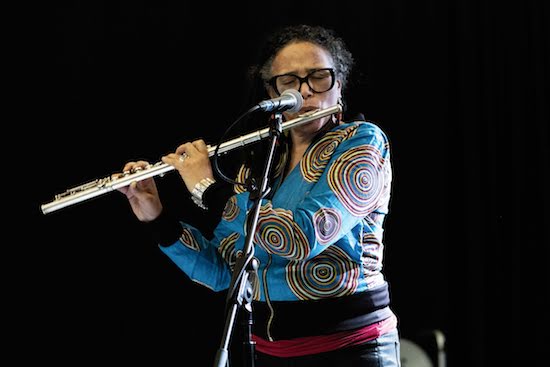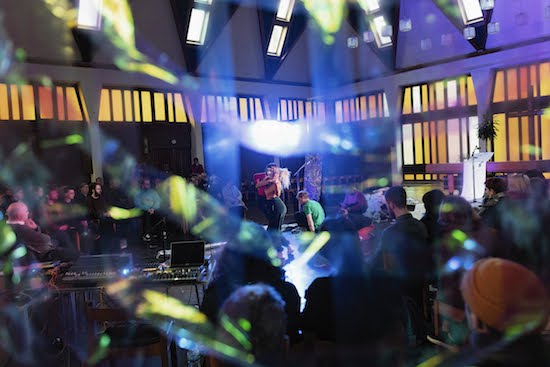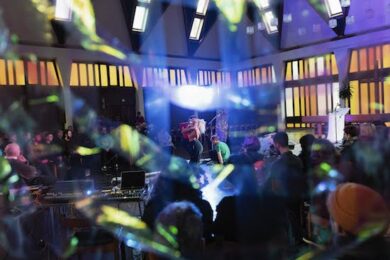All photographs by Dawid Laskowski
If a megabucks commercial music festival is the equivalent of a flash numpty blowing £500 on the fanciest bottle on a hyped restaurant’s wine list who gets so hammered that they can’t even remember what it tastes like and doesn’t tip, then Counterflows is the diner that likes to get drunk, yes — but probably on the weirdest, most underloved and interesting wine there is. Counterflows festival would also tip generously, despite its own modest cash flow. This festival is warm and kind, so would stop to chat with the person serving — who is also making crap money. Counterflows cares where the bottle of wine came from, always likes to try local produce. And in order for this terrible, clumsy extended metaphor to work, the cooking at this restaurant is also international and experimental.
The eighth Counterflows festival describes itself in its canary yellow, hand-printed zine programme as a, "gathering of radical music makers, artists and fellow devotees of cultural exploration. Four days of listening, sharing, dancing and hanging out, spread across the best spaces in Glasgow."
What it doesn’t like to shout about is its long-running, quiet but genuine commitment to booking musicians outside the white, young, male bracket, and from places far beyond Scotland, who are often invited to collaborate with artists who live a few minutes’ cycle distance away. It’s not something they do cynically, so they can tick the box on a funding application to show they are promoting diversity, but because they sincerely want to keep their festival lineups broad and interesting. It’s weird, but that’s just always been something normal to them.
The programme also mentions their desire to fight, "the creeping isolationist agenda and loom of age-old hierarchies", so it seems especially shit, if not unsurprising, when the UK Border Agency do their bit to shut down transnational party times and cultural swaps by denying visas to non-British artists. Aklama Makumba and the Ghana Footsteps were meant to be visiting from Ghana to play with Glasgow-based artists (supported by The British Council West African Festival Fund, ironically enough) and Iranian tambuk player Mohammad Reza Mortazavi was due to perform on the opening night but both events had to be cancelled after visa difficulties.
You can’t keep a good festival down though and Arash Moradi, a tanbur player from Iran, took an unexpected call in his hometown of London at 2pm, said yes, got on a train, and was onstage at Maryhill Community Central Hall, Glasgow at 9pm, standing in for Mortazavi. After a shy intro, he calmly sent himself and the crowd into a trance with his hypnotic, rhythmic playing of the three-stringed instrument, rarely heard outside Kurdistan.
The music at the festival is deliberately far-reaching and hard to categorise – and designed, if time allows, to be consumed in one full festival buffet spread, rather than one potential head-scratcher of a snack. Those wandering in to The Doublet Bar for a pint, for example, as Edinburgh performer Stewart Greenwood unleashes his tremendous, breathless, accordion rampage through letters of the alphabet in an outsider sea-shanty look a bit concerned for him, until they realise he’s part of the evening’s Counterflows bill. Troubled stares morph into nervous smiles then loud whoops as the passers-by realised yes, it was supposed to be a bit weird, and yes, it was ok to laugh. Greenwood’s fizzing, jerking sailor’s jig leg work seemed to reassure them he is, in fact, having a great time.
Where else could you find on the same festival bill such reassuringly strange, mainstream repelling live acts as a minimalist yodelling duo and a solo set of absurdist rubbish bin bagpipes? And that’s just the first night.
There is nothing beige or predictable about the staggering display of twin-like telepathy when Doreen Kutzke, with yellow plaits tied high on her head, and her yodelling student Myriam Van Imschoot perform their jittery song cycle. Inspired by a skipping CD of yodel songs sent from Kutzke’s yodelling school in Berlin to Van Imschoot’s home in Austria, their unaccompanied singing splutters, trips and pauses for many beats, then miraculously restarts in unison, without any eye contact or signals between the women. Sholto Dobie’s serene performance plays around with breath control and air supplies in an altogether different way; using a plastic bird toy, a slide whistle and one of those tipping toys that makes a cow sound to confound, and at the same time, charm the crowd. He gets up from his prop table and mic to inflate a flock of strange plastic creatures around the community hall, letting their slow-filling cavities wheeze and whine around the audience.
The venues, as promised, play an important part in the festival. After eating paper plates of free vegan food (spooned out for the queues by the Glasgow Supper Club) at Maryhill Community on the Thursday, two free coaches ferried the audience to the Art School after a detour to Anderston and Kelvingrove Community Church. An apple green, modernist pyramid with yellow rectangle windows, it was discovered through Glasgow’s Open Doors Day and used as the backdrop for Katz Mulk’s bendy, radiophonic dance work. Commissioned by the festival, the collective (Ben Knight, Andrea Kearney, Ben Morris and Siân Williams, joined here by Letitia Pleiades) blur what is choreographed with what is spontaneous, letting drum machines, tin foil sculptures and rhythmic body tremors meld their piece together. Different vernaculars of dance take their cues from the same written score, displayed behind them, then a massive balloon is inflated with a hairdryer and hundreds of necks tilt backwards to watch it float quietly up into the triangle point of the church’s pyramid roof.

The coaches (with a local radio station blasting out 90s bangers) also scooped up the crowd from Kinning Park Complex, where flautist Nicole Mitchell, cellist Tomeka Reid and pianist Alexander Hawkins performed together as a trio for the first time. Mitchell and Reid let the fluid energy of Chicago’s avant-garde jazz scene off the leash as they wrapped their restless grooves around the structure of Hawkins’ speedy piano lines. Being a Sunday, the crowd (some hungover from The Art School’s carnival, guarapo party with Glasgow’s Ashanti and North Colombia’s Jim C Nedd the night before) congregated in hushed silence to worship sonic innovation in a Southside building that’s also used for community meals, aikido classes, gigs and a project that gives away free bikes to those who can’t afford them.
The Friday night’s partying was dominated by the chocolate-milk sipping feminist chutzpah of MC Carol, playing Scotland for the first time. After the crowd had found themselves pummelled into party mood by the joyful, digital, percussive, spoken word riot of Humming Dogs (a neuro-diverse improv collective from France), they moved downstairs into the bar for the night shift. The Brazilian baile funk singer from the favelas of Preventório is not about to let anyone — including President Bolonsar — silence her and gets a translator from the crowd up on stage to translate her sex positive, in-your-face good vibes; “I want to give my pussy to everyone!”, she grins, before powering through ‘100% Feminista’, which she wrote about domestic violence that she’s seen in her family and modern Brazilian life.
South American music sub-culture got another look-in with the screening of Pico: Un Parlante de Africa en America, a documentary about the mega soundsystems that make street parties bang in Colombia. Hand decorated with neon spraypaint wolves or robots, the picos travel up and down the Caribbean coastline, as various talking heads explain, including a less-rare-than-it-used-to-be female DJ and some extra-hyper MCs, dialling up the adrenaline levels over the top of bubbling hot samba and soukous beats.

The weekend ends with the organisers toasting the artists with £14 bottles of prosecco bought from behind the bar at Queen’s Bar Bowling Club. Under a wooden leaderboard of bowling champions through the years, Chrystabel Riley unleashes a frenzy onto a drumkit that starts out covered by a handstitched bedsheet. Dressed in a power suit, with her newborn baby gurgling loudly somewhere in the Bowling Club crowd, she ends Counterflows on a high, battering through patterns of rhythm and texture, noodling through shapes and eras with her unfixed style.
For any folks that like a good party but are also keen to find ways to fight ‘the creeping isolationist agenda and loom of age-old hierarchies’, Counterflows is a gently radical reminder that those feelings are mutual. Their lineup is a reassuringly human assertion that (to quote from Arika, another Scottish arts organisation that merges the experimental with the socio-political), ‘other worlds already exist’. Utopias where there are mesmerising polyrhythmic drums, enchanted plastic bags, glitchy yodelling, dancefloor freakouts, sombre new tuba symphonies for your hangover and free curry for all. Watching the barriers between these weird worlds drop for four days was a wonderful, fun thing.


